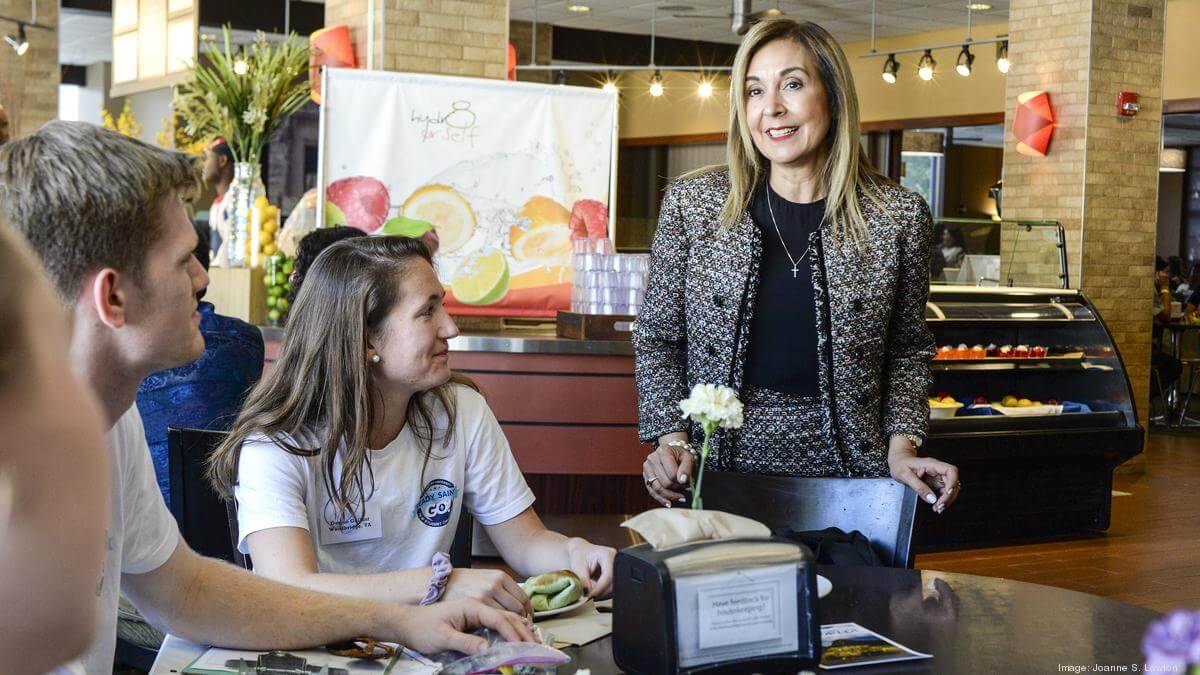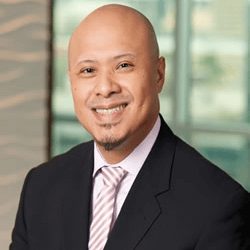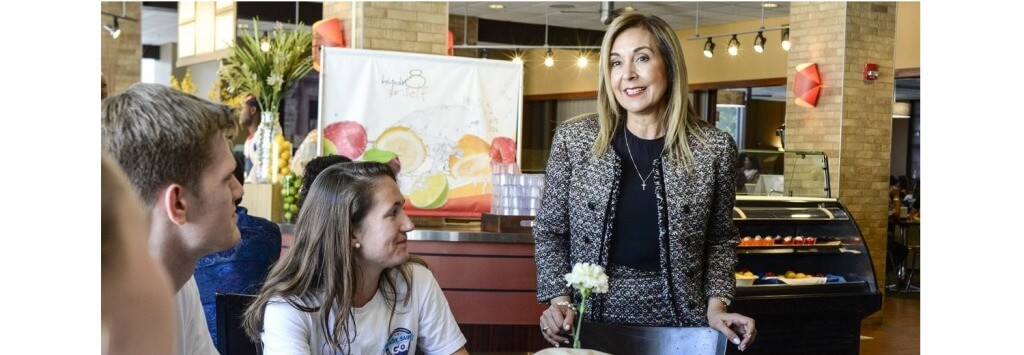
In this new higher Ed thought leadership series, Dr. Emad Rahim interviews Dr. Irma Becerra, President of Marymount University. Dr. Becerra took office as the seventh President of Marymount University on July 1, 2018. During her tenure so far, she has launched the University’s new strategic plan, added market-driven academic programs that prioritize career preparation, acquired The Rixey luxury apartment building for use as a new residence life option, and improved the university’s IT infrastructure through the implementation of Workday.
She is a nationally recognized educator known for innovation, entrepreneurship, and transformational education. Prior to Marymount, she served as Provost and Chief Academic Officer at St. Thomas University, and also spent three decades at Florida International University (FIU) in a variety of positions that include Vice President, Vice Provost, Entrepreneurship Center Director, and tenured professor. She became the first woman to earn a Ph.D. in electrical engineering at FIU.
Dr. Emad Rahim: Please tell us how you got started in your career as President of Marymount University.
Dr. Irma Becerra: It really goes back to when I was an engineer at Florida Power & Light after I had graduated with my master’s degree from the University of Miami. I discovered my passion for adult education when I taught statistics as a corporate instructor, which led me to go back to school and get my doctorate. I became the first woman in the history of Florida International University to receive a Ph.D. in electrical engineering. I then worked for a NASA-funded center at the University of Florida, and joined the faculty at FIU…where I would spend the next 12 years working to become a tenured full professor in Management Information Systems, and also founding FIU’s Knowledge Management Lab. I was also a Sloan Scholar at MIT’s Center for Information Systems Research.
Around this time, I discovered how I could make a greater impact on more lives through education administration. Leaving the classroom, I served in a variety of positions at FIU…including Entrepreneurship Center Director, Vice Provost and Vice President. I then moved to St. Thomas University in Miami Gardens, Florida…where I was Provost and Chief Academic Officer. Finally, in the summer of 2018, I was selected as Marymount’s seventh president.
E. R: What is your leadership style and how has it evolved during your presidency?
I. B: I have a collaborative leadership style that is informed by my years in knowledge management research. During those years, I was an advisor to NASA and helped them understand the strengths that come from being a premier knowledge sharing organization, as well as the value of the collective. That value is highly important in decision making, and it allows me to value cognitive diversity when solving difficult problems. My cabinet members and I discuss, understand our different perspectives and then make the decision and move forward.
During the pandemic, we’ve had to make critical and pressing decisions quickly. Therefore, we’ve adopted a rapid prototyping approach because many times we must act before we have all of the information that we ordinarily would like to have to make informed decisions. We make decisions based on current data and we see the results, sometimes tweaking based on results if necessary. In an evolving environment like the one we all find ourselves in the last few months, there have been times we’ve had to revisit decisions and take a new course.
E. R: What is the mission of Marymount University and what makes your University unique?
I. B: Our mission is that Marymount is a comprehensive Catholic university, guided by the traditions of the Religious of the Sacred Heart of Mary, that emphasizes intellectual curiosity, service to others and having a global perspective. A Marymount education is grounded in the liberal arts, promotes career preparation and provides opportunities for personal and professional growth. A student-centered learning community that values diversity and focuses on the education of the whole person, Marymount guides the intellectual, ethical and spiritual development of each individual.
We were founded in 1950, and are currently celebrating our 70-year anniversary. When Marymount started, our niche was that we focused on preparing women for work. Much has changed in 70 years, including that we are now co-educational, but what hasn’t changed is the practical nature of our programs that are market-driven – in fields such as cybersecurity, nursing, business, physical therapy, interior design, fashion merchandising, etc.
We were also one of the first universities to require an internship for all of our students, because we understood the connection between having an internship and then getting a job post-graduation.
E. R: How is the University addressing campus safety and academic accessibility with the global pandemic?
I. B: In early June, we released our “Saints Reunite” guide to reopening campus in advance of the upcoming fall semester. In our plans, we have restructured all of the physical spaces we use for learning, living, working and eating to comply with social distancing guidelines. Everyone is required to wear a mask on campus to keep others and themselves safe. And of course, we made a lot of changes in the residence halls as well, while also creating more spaces for people to eat outside.
More Higher Ed thought leadership Series Interviews
Emad Rahim Interviews Dr. Mary Hawkins, President of Bellevue University
Emad Rahim Interviews Merodie A. Hancock, PhD President, Thomas Edison State University
E. R: With more universities going online, what type of things are you doing to set your programs apart?
I. B: While we do offer a few fully-online programs, such as our new Doctorate in Education and multiple nursing programs, our preferred mode of learning is face to face and that’s what we’re getting ready for in the fall. However, if circumstances change, we are prepared to quickly pivot to remote learning. We call this approach “Hy-Flex,” which means “hybrid-flexible.” The Hy-Flex approach provides the infrastructure for students to attend physical classes in a remote fashion if necessary, whether it’s because they are still in the process of returning from abroad or if they’re in quarantine.
What hasn’t changed, regardless of the delivery mode, is our small student to faculty ratio…which is 12:1. We offer the same personalized education that we always have with the same, close learning relationship between students and faculty, either in person or at a distance.
E. R: Where do you see your university going in the next five years given all of the challenges and changes that higher education is facing around the world?
I. B: Well, before the pandemic began, we were in the process of implementing our Strategic Plan, “Momentum.” Our work on our strategic goal – becoming nationally recognized for innovation and commitment to student success, alumni achievement and faculty and staff excellence – has not stopped during the pandemic. One example is our continued rollout of a cloud-based enterprise system, Workday. We have already completed one-third of this process, and we’re starting the second phase in July. The pandemic has heightened our awareness of how important it is to have a cloud-based system in place, because it will give us additional flexibility to operate remotely if the need arises.
E. R: Given the Black Lives Matter movement, protests and rallies against racism and police brutality happening across our nation, do Catholic institutions like Marymount have a responsibility in addressing these society issues?
I. B: I’ll go a step further and say that all universities have the responsibility to address social justice issues. At Marymount, one of our Strategic Plan initiatives is focused on diversity and inclusion. We’ve already created an Inclusion Network consisting of volunteers of faculty, staff and students, and we have updated our bias incident report process to create a more positive campus climate. Going forward, we have a number of recommendations we are seeking to implement, such as further diversifying both our faculty and our Board of Trustees (our staff is already quite diverse). This is a continuing effort. We are also always listening to our students for feedback to understand what they’re looking for, and have recently held several active listening sessions for this purpose.
E. R: Faculty play a critical role in the development of your students’ learning and in helping build their professional competencies. What type of things are your faculty involved in or doing that makes their classroom unique to their learning experience?
I. B: Our faculty members are mentors to our students, in particular for career development. They’re very engaged in identifying internship opportunities for our students and guiding their learning experiences. And because we have such a small student-to-faculty ratio, our faculty know all of our students by name and stay connected with them even after graduation.
E. R: What type of qualifications and experiences do your faculty bring to the class? How do you make sure they stay updated in their area of expertise and field of study?
I. B: All of our faculty are active researchers, and many of our students are engaged in research with them even as undergraduates and publish papers together. We also bring a lot of experience into the classroom through a sizable number of adjunct faculty who work in the greater Washington area, as well as guest speakers.
E. R: We learned a great deal about you and your school. If I was a potential student, what other things would you want me to know about your degree programs and campus to help with my selection?
I. B: We keep a constant eye on the degrees and skills that are needed in today’s workforce. Just in the last year, for instance, our School of Business and Technology has launched several new programs like Upskilling for the What’s Next Economy and the Marymount Intrapreneurship Initiative. It has also focused on creating a new set of stackable graduate certificates in data analytics, cloud computing, cybersecurity, entrepreneurship and many others. These stackable certificates can combine into a master’s degree in Emerging Technology, which gives students the tools they need to seize the opportunities that the market currently provides. We also offer high-demand, second degree programs in areas such as cybersecurity and nursing, and a student could spend an immersive year in these programs and completely change their career.
I’d also say that our location in the DMV, the greater Washington, D.C., area, complements our academic programs and internship opportunities. Whether you are interested in walking the halls of the White House or Congress, teaming up with Amazon as it builds its second headquarters right here in Arlington or researching new medical treatments at the National Institutes of Health, we can get you there.
Links
Dr. Irma Becerra
https://www.linkedin.com/in/irma-becerra-phd-8753a91/
https://twitter.com/DrIrmaBecerra
https://www.instagram.com/presidentbecerra/
Marymount University
https://www.facebook.com/marymount.university/
https://twitter.com/marymountu
https://www.instagram.com/marymountu/
https://www.linkedin.com/school/marymount-university/

Dr. Emad Rahim is an award-winning entrepreneur, educator, author, community leader and TEDx Speaker. He currently serve as the Endowed Entrepreneur-in-Residence at Oklahoma State University and teaches at the Jack Welch Management Institute in the Executive MBA program. He was recognized by the United Nations Foundation as a 2013 Empact100 Honoree for his social entrepreneurship work, received a Congressional Award for his community service and was the recipient of the Forty Under 40 Business Leadership Award sponsored by Syracuse University. His personal story was turned into a short documentary, “Against the Odds,” and featured in the Huffington Post and Forbes. He co-authored “Leading Through Diversity: Transforming Managers Into Effective Leaders” and “The 4-Tions: Your Guide to Developing Successful Job Search Strategies” and is a frequent contributor to the Refractive Thinker book series, CEO Magazine, TweakYourBiz and YFS Entrepreneurship Magazine. Fellow him on Twitter @DrEmadRahim












